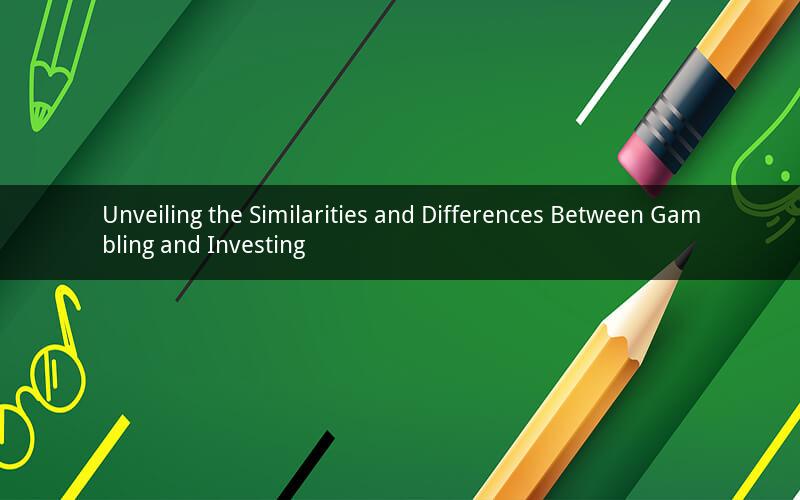
Introduction:
Gambling and investing are two distinct activities that often evoke contrasting opinions. While some may argue that they share commonalities, others believe they are fundamentally different. This article aims to explore the similarities and differences between gambling and investing, shedding light on the factors that differentiate these two practices.
Similarities:
1. Risk and Reward:
Both gambling and investing involve risk and the potential for reward. In gambling, individuals place bets on uncertain outcomes, hoping to win money. Similarly, investors take risks by investing in various assets, such as stocks, bonds, or real estate, with the expectation of generating profits.
2. Uncertainty:
Both activities are characterized by uncertainty. In gambling, the outcome of a game or bet is unpredictable, making it difficult to determine the outcome beforehand. Similarly, investing in the stock market or other financial instruments involves uncertainty, as market conditions and asset prices can fluctuate significantly.
3. Time Factor:
Gambling and investing both require time. Gamblers spend time playing games or placing bets, while investors spend time researching and analyzing investment opportunities. Both activities require patience and a long-term perspective to achieve sustainable results.
Differences:
1. Purpose:
The primary purpose of gambling is entertainment and the thrill of winning. Gamblers often seek the adrenaline rush and the excitement of taking risks. On the other hand, investing is primarily driven by the goal of generating wealth and financial stability. Investors aim to grow their capital over time and achieve financial objectives.
2. Skill and Knowledge:
Gambling often relies on luck, as the outcome is largely unpredictable. While some games may require strategy or skill, the element of chance still plays a significant role. Investing, on the other hand, requires a certain level of skill, knowledge, and research. Investors need to analyze financial statements, market trends, and economic indicators to make informed decisions.
3. Regulation:
Gambling is heavily regulated in many countries to prevent fraud, money laundering, and other illegal activities. It is subject to strict laws and regulations to ensure fair play and protect consumers. Investing, while also regulated, is generally less restrictive. Investors have more freedom to choose their investment vehicles and strategies.
4. Time Horizon:
Gamblers often have a short-term perspective, focusing on immediate wins or losses. They may place bets with the intention of winning quickly and moving on. Investors, on the other hand, typically have a long-term perspective, aiming to achieve sustainable growth over several years or even decades.
5. Emotional Control:
Gambling can be emotionally charged, with individuals often succumbing to greed or fear. The thrill of winning can lead to irrational decision-making, while losses can trigger emotional reactions. Investing requires emotional control and discipline, as investors need to stay focused and make rational decisions based on analysis and research.
Conclusion:
In conclusion, while gambling and investing share certain similarities, such as risk, uncertainty, and the need for time, they differ significantly in purpose, skill requirement, regulation, time horizon, and emotional control. Understanding these differences is crucial for individuals to make informed decisions and choose the path that aligns with their financial goals and risk tolerance.
Questions and Answers:
1. Q: Can investing be considered a form of gambling?
A: While investing and gambling share some similarities, investing is generally not considered a form of gambling. Investing involves research, analysis, and a long-term perspective, whereas gambling relies more on luck and chance.
2. Q: Is it possible to be successful in both gambling and investing?
A: It is possible to be successful in both gambling and investing, but it requires a different mindset and skill set. Successful gamblers often rely on luck, while successful investors require knowledge, research, and emotional control.
3. Q: What are the potential risks associated with gambling?
A: The potential risks of gambling include financial loss, addiction, and the negative impact on personal and professional life. It is important to approach gambling responsibly and set limits to avoid excessive risks.
4. Q: Can investing be compared to playing a game of chance?
A: While investing involves some level of uncertainty and risk, it cannot be directly compared to playing a game of chance. Investing requires analysis, research, and a long-term perspective, whereas games of chance rely solely on luck.
5. Q: Is it necessary to have a financial background to be successful in investing?
A: While a financial background can be beneficial, it is not necessary to have one to be successful in investing. Many individuals have achieved success in investing through education, research, and the development of a disciplined approach.